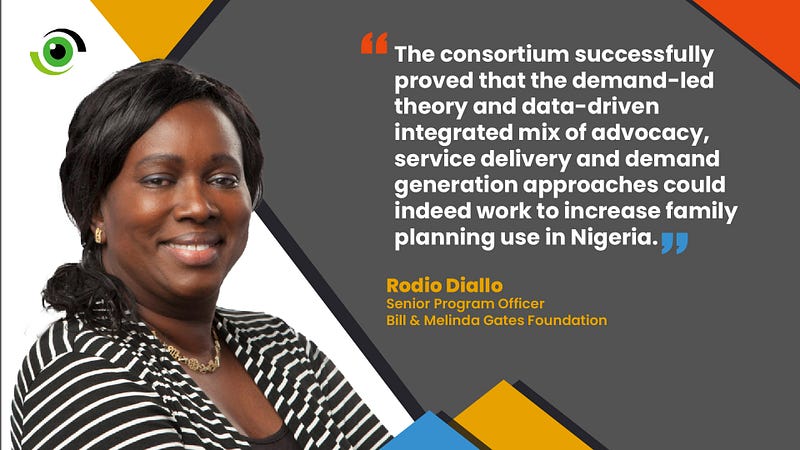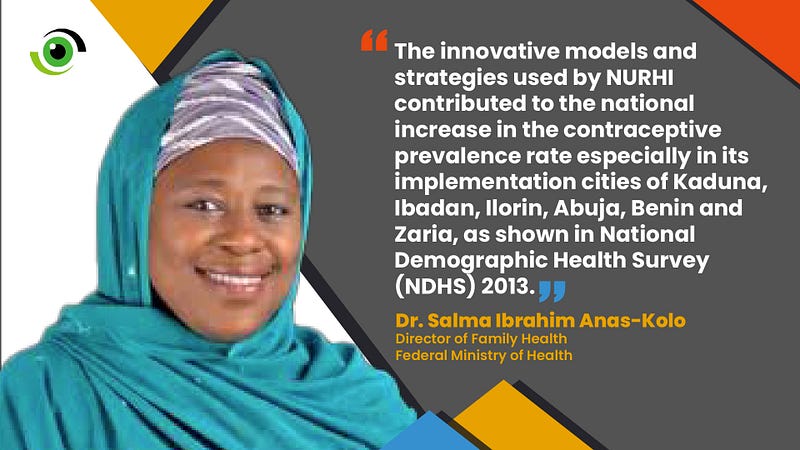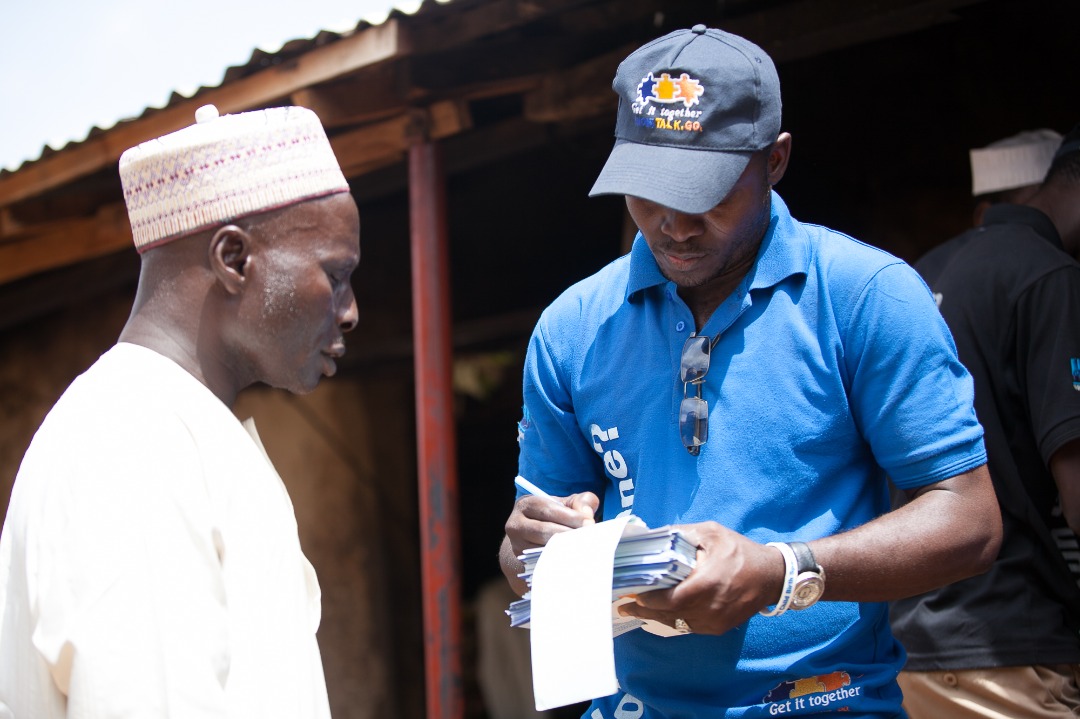By Kenneth Ibe & Olubunmi Oyebanji (Lead Writers)
The availability of family planning services, enables girls and women to make informed choices about birth spacing and their desired family size. It also contributes to improved sexual and reproductive health and the wellbeing of children, women, and families. Many sexually active women are still not empowered to make informed choices in developing countries like Nigeria. This is often because they do not have access to the information they need, the poor availability of reproductive health services or negative myths and misconceptions about contraceptive use.
The Nigeria Urban Reproductive Health Initiative (NURHI), a project implemented by the Johns Hopkins University Centre for Communication Programs (JHUCCP) was launched in 2009 with funding by the Bill & Melinda Gates Foundation (BMGF). Its objective was to make family planning a social norm, ensuring that no woman of reproductive age is denied access to the desired family planning services they need. To mark the end of the NURHI 2 Project, virtual dissemination meetings were organised by the Kaduna, Lagos and Oyo State’ Ministries of Health and the Federal Ministry of Health in collaboration with NURHI, themed: NURHI Project — A Decade of Repositioning Family Planning for Childbirth Spacing, Proof of Concept, Innovation, Successes, Learning and Sustainability.
In her opening remarks at the national close-out event, the Director, Department of Family Health, Federal Ministry of Health, Dr Salma Ibrahim Anas-Kolo, spoke about the impact NURHI has made in Nigeria, despite initial challenges. The project was designed to be implemented over five years initially, from September 2009 to 2015. However, the success of the first five years prompted the project funders to extend it for another five years (2015–2020). The innovative models and strategies used by NURHI contributed to the national increase in the contraceptive prevalence rate, especially in its implementation cities of Kaduna, Ibadan, Ilorin, Abuja, Benin and Zaria, as shown in the Nigeria Demographic and Health Survey (NDHS) 2013 Dr Anas-Kolo said.
Breaking boundaries in the use of modern contraception in Nigeria
Rodio Diallo, Senior Program Officer at the Bill & Melinda Gates Foundation in her comments pointed out that the Foundation partnered with the Nigeria government (Federal and State Ministries of Health), indigenous NGOs (Association for Reproductive and Family Health and the Centre for Communication and Social Impact) and Johns Hopkins Center for Communication Programs (JHUCCP) to launch the NURHI project in Nigeria in 2009. Diallo stated that NURHI is a comprehensive initiative intended to test novel approaches to create demand for and sustain the use of modern contraceptives among marginalised urban populations in Nigeria, while improving the quality of services. She said the Foundation wanted to ensure that a supportive policy and environment that sustained funding and family planning provision was created. The consortium successfully proved that the demand-led theory and data-driven integrated mix of advocacy, service delivery and demand generation approaches could indeed work to increase family planning use in Nigeria.

The introduction of the NURHI project in the six target cities saw a pronounced 10% increase in the use of modern contraceptive methods and a similar increase in the desire for contraception products in the 3 million women of reproductive age, through a network of 244 primary health care facilities. The Portfolio Director, JHUCCP Family Planning Portfolio, Nigeria Dr Mojisola Odeku, in her remarks at the national close-out and end of project dissemination said, “The NURHI model is a proven pathway to achieving universal access to quality family planning services in Nigeria. Successful scale-up requires learning, adapting and refining to suit local contexts.”
Changing Cultural Perceptions of Modern Contraception in Nigeria via Social and Behavioural Change Communication
Before the NURHI project in Nigeria began, family planning was shrouded in myths and misconceptions. Modern contraception was misunderstood as a method used to prevent people from giving birth.
Recognizing that most sociocultural barriers to family planning were due to lack of correct information, poor community sensitisation, and cultural barriers, NURHI set out to understand the cultural, religious and geographical perceptions of its implementation cities prior to starting implementation and acknowledging these factors as critical to effective demand generation and service delivery.
In overcoming these barriers, NURHI adopted key strategies such as the training of Community-Based Organisations (CBOs), stakeholders at both the state and local government levels, media organisations and youth organisations that collaborated with healthcare workers within community clinics, to ensure the availability of modern contraceptives and to improve quality and access to these services. NURHI also leveraged the influence of critical stakeholders such as community influencers, religious and political leaders, social media influencers, print and electronic media to disseminate messaging about the importance of family planning in order to make it a social norm among Nigerians.
Impact of NURHI across the Focus Project States
The impact created by the NURHI project leaves a legacy in the family planning space in Nigeria. The Reproductive Health Coordinator at the Kaduna State Primary Health Care Board, Hajiya Nafisa Musa, commended the outcomes of the NURHI 2 programme in Kaduna State and its service delivery approaches. She stated that between 2015–2020, 20 facilities were renovated in the 15 LGAs of Kaduna State from the 72-hour makeover programme while 777 stakeholders and 192 journalists were trained on family planning provision and messaging during the period.
The intervention of the NURHI 2 project in Kaduna State reached 578,167 people with family planning messages through various social mobilisation networks across the state, she said. At the closeout event in Oyo State, Dr Babatunde Olatunji, the representative of the Commissioner for Health in Oyo State said that “NURHI is a household name across the state, working with health workers to reduce maternal mortality through effective family planning programmes”. He added that the contraceptive prevalence rate (CPR) in the state was 18.4% 10 years ago but has increased to 30% in Oyo State.

In Lagos State, Dr. Victoria Omoera, the Reproductive Health Coordinator, at the Lagos State Ministry of Health, attributed the improvement of Lagos’ modern contraceptive prevalence rate (mCPR) from 26% in 2013 to 29% in 2018, to NURHI supported intervention in the state. She added, “As part of NURHI’s programme outcomes between 2015–2020, 320,695 women received family planning services in NURHI supported high-volume facilities in Lagos, and 74,446 women received family planning services through outreaches in NURHI2 supported LGAs in Lagos State.”
Renovations of family planning units were also done in Lagos State. Dr Olusegun Ogboye, Permanent Secretary, Lagos Ministry of Health, said “NURHI provided a lot of support to family planning in Lagos State. They trained healthcare workers, and renovated and equipped family planning units in 54 primary healthcare centres”.
The Exceptional Impact of NURHI 2 on Young People
Yusha’u M Abubakar, a representative of young people in Kaduna State said that the NURHI 2 Project has made a difference in young people’s access to reproductive health services in the state. With the large population of young people in the state, he said the state needed more reproductive health information and services than ever before.
He stated that the sustainability plan put in place is a major step that will nurture the legacy of the NURHI 2 project even as the project closes out, while young ambassadors will continue with the legacy to extend family planning messages to the public.
He called on state governments as key actors to the Sustainable Development Goals (SDGs), to ensure that they increase investments in the reproductive health needs of young people in all state programmes. He urged that governments should properly budget and release funds timely to ensure that the reproductive health needs of young people are being prioritized.

Sustainability Plans of NURHI 2 by the Government of Nigeria
NURHI in the last 10 years in Nigeria has instilled exemplary legacies in innovation, coordination and partnership in the family planning landscape that must be sustained, not just in the project states, but to other states of the federation.
Family planning is imperative for the achievement of improved maternal and child health and improved quality of life. Governments at all levels must integrate family planning programming in health policies and at all health facilities across Nigeria to reduce the high rate of maternal mortality in Nigeria. As Dr. Mojisola Odeku said during the launch of the NURHI Storybook, ‘Making Family Planning a Social Norm’, “Government investment and funding of family planning is a key requirement for the success of the UHC agenda”.
Have you or anyone you know received family planning services from a primary health centre in your community? Share your experience with us in the comment section below, or on Twitter @nighealthwatch, or Facebook and Instagram @nigeriahealthwatch.



